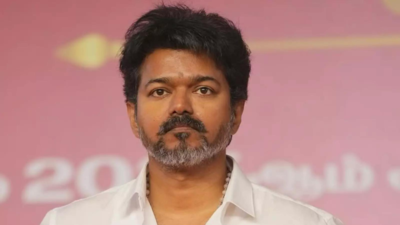NEW DELHI: Police in Kunnam have registered a case against actor-politician and Tamilaga Vettri Kazhagam (TVK) chief Thalapathy Vijay along with his bouncers following a complaint of alleged assault.According to officials, the case was filed based on a complaint submitted by Sarathkumar at the Perambalur District Superintendent of Police office. He alleged that he was manhandled by Vijay’s bouncers during an incident.Kunnam Police said a case has been registered against Vijay and his security staff under three sections of the Indian Penal Code.The development comes as Vijay, who founded TVK in 2024, seeks to position himself as a major challenger in Tamil Nadu politics. Earlier this month, the actor-politician declared that he would contest the 2026 assembly elections from Madurai East, making his most direct pitch yet to take on the ruling Dravida Munnetra Kazhagam (DMK).At the party’s second state conference in Madurai, Vijay launched a fiery attack on the DMK, calling it his main political rival while identifying the Bharatiya Janata Party as TVK’s “only ideological enemy.” Drawing loud cheers from thousands of supporters, he declared, “TVK is not a political game; it is an ideology. This is not a speech for publicity. This is a warning to those who are in power. TVK is here to dominate. Crores of people are with us. The 2026 election is a fight between TVK and DMK.”Vijay has sought to frame TVK as a clean, uncompromising force. “TVK is not a party that makes underground deals, forges alliances, and cheats the people. We are not afraid of anyone. The people of Tamil Nadu, the women and the youth stand with us,” he said. At the rally, he also promised to “free Katchatheevu island from Sri Lanka” and ensure the safety of Tamil Nadu fishermen, a long-standing political demand in the state.His recent political events have drawn massive crowds, underlining his appeal beyond the silver screen. The Madurai rally was billed as TVK’s biggest mobilisation yet, echoing historic elections of 1967 and 1977 when new parties under CN Annadurai and MG Ramachandran rose to power. Vijay, however, enters politics as a newcomer despite his two-decade-long popularity as a film icon.The actor-turned-politician has also been sharpening his criticism of chief minister MK Stalin’s DMK government. On social media, he condemned the arrest of protesting sanitation workers in Chennai as “fascist” and “inhumane.” He has repeatedly attacked both state and central governments on issues such as custodial deaths and the National Eligibility-cum-Entrance Test (NEET), demanding its abolition. “Revoke NEET! Can you do it, Narendra Modi avargal?” he asked, directly addressing the Prime Minister.Even as his rallies have showcased TVK’s growing strength, they have not been without setbacks. At the recent Madurai conference, a 33-year-old party worker from Chennai, Prabhakaran, collapsed and died on his way to the event, casting a shadow over the gathering.











